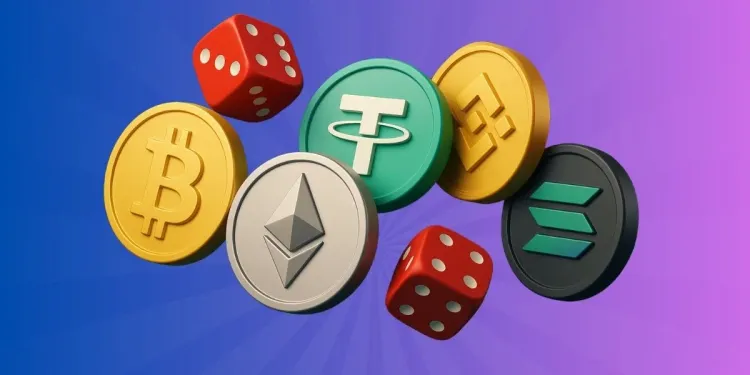Crypto Guide: Types of Cryptocurrencies in the Market

Bitcoin remains the most important crypto in the market, with a market cap of $1.339 billion. While it's arguably the most popular and consequential crypto, it's just one of the thousands of cryptocurrencies that form part of the global market currently valued at $2.47 trillion. There are different types of cryptocurrencies which offer different functionalities, with unique use cases. The most popular coins are used to pay for transactions, and others are used to scale blockchain networks.
Bitcoin is arguably "the trailblazer", but today's crypto market consists of thousands of unique projects. Most of these projects rely on different technologies and functionalities, thus creating plenty of use cases. Some of these cryptocurrencies are used for payments, others for supporting blockchains, and some for entertainment. You'll find serious crypto projects that aim to promote decentralized finance and peer-to-peer transactions, and some even rely on internet memes that are supported by vibrant communities.
At the heart of these projects is the blockchain technology, an advanced database mechanism that allows for transparent sharing of information in a public network. Bitcoin is the first major project that tap the blockchain, and now serves as the foundation of the crypto industry. In Satoshi Nakamoto's white paper, he envisions a "peer-to-peer electronic cash system", that is free from the influence of third parties.
Immediately after Bitcoin's launch, several other crypto projects have been started, with mixed results. Some have become successful, and others with no clear use cases. Most of these cryptocurrencies work on a peer-to-peer electronic cash system, others function as peer-to-peer information sharing systems. In short, the crypto industry has grown not just in size and market cap, but in terms of complexities as well.
Understanding how these cryptocurrencies work, their technologies, and use cases can be helpful as you dive into the Web3 space. In this blog, we'll cover first the four common cryptocurrency types you'll encounter in the market.
From payment to services: Understanding the popular cryptos
Ultimately, different cryptocurrencies serve different roles within the Web3 economy. If you're planning to get into crypto or just want to learn more things about the technology, it's best to start by knowing the different types of cryptocurrencies.

Payment cryptocurrencies
For most individuals, cryptocurrencies offer a way to store and transact value. Payment cryptocurrencies also come in four common types: store of value, meme coins, stable coins, and privacy coins. Primarily, these projects aim to disrupt the traditional payments industry. Instead of simply allowing simple payments, payment cryptocurrencies offer an infrastructure that can transfer, record, and secure financial transactions.
Most of these projects aim to reduce our reliance on government-issued currencies and provide the unbanked with financial opportunities. Through payment cryptocurrencies, the unbanked population enjoys accessibility and lower transaction costs. Bitcoin, the premier cryptocurrency, is an example of a payment currency. In Bitcoin's white paper, Nakamoto described the Bitcoin as a "peer-to-peer electronic cash system".
There are at least four common sectors in the payments crypto category: stores of value, meme coins, stable coins, and privacy coins. A store of value cryptocurrency is seen as an asset which holds value over time relative to fiat currencies. Popular examples of store of value cryptos are Bitcoin, Bitcoin Cash, and Litecoin, all boasting fixed and clearly maximum supply. Then there are the meme coins, the cryptocurrencies with vibrant communities. These are also used for payments but comes with limited utility.
Individuals can also use stablecoins to pay online. These coins pegged to an external reference, like the US dollar, making its market values "more stable". Finally, payment cryptos can also be privacy coins. These are the types of payment cryptos that are designed to boost the transaction's anonymity by "obscuring certain information" such as amount spent, and details about the sender and receiver.
Infrastructure cryptocurrencies
Infrastructure cryptocurrencies are those tokens primarily used for improving the underlying technology and the platform where it operates. These types of tokens are associated the blockchain networks that boast a smart contract functionality, or codes that allow developers to design self-executing agreements that power different applications. A popular example of thus crypto category is Ethereum's Ether, since it plays a crucial role in the creation and use of decentralized applications or dApps that are built on the blockchain.
Infrastructure cryptocurrencies fall into one of these three categories: for application development, scaling, and communication. Today, the most common tokens used for application development are Ether, Solana, and Avalanche.
Financial cryptocurrencies
There is also a separate category of tokens for financial cryptocurrencies. These are your cryptos that offer tools for the management and exchange of assets within the cryptocurrency ecosystem. For example, a cryptocurrency that's a native to a centralized or decentralized exchange may be considered as a financial cryptocurrency. And the use of these tokens may reward holders with lower trading fees. Also, governance tokens may be categorized as financial cryptocurrencies. The three most popular types of financial cryptocurrencies are financial markets, for asset management, and structured/exotic products.
Service cryptocurrencies
The crypto industry is also home to service cryptocurrencies, or those tokens used for managing and sharing data in the platform. Some of the top service cryptocurrencies provide users with digital identity, and link records from the real world to the blockchain. Examples of service cryptos are DePIN, file storage, and tokens for digital resource markets.
DePIN is the Decentralized Physical Infrastructure Networks which use token rewards and the blockchains to decentralize infrastructure in the real world where individuals share physical resources in diverse fields such as energy and transport.
In a DePIN application, the blockchains serve as administrational, remittance, and record-keeping facilities. As an administrational facility, a DePIN design a permissionless system for users and providers using the blockchain. In short, anyone can offer services, provided there are resources.
As a remittance facility, a DePIN allows participants to enjoy services in the blockchain and get rewards in crypto. Finally, the DePIN can also work as a record-keeping facility since all details of an action is publicly recorded in the blockchain.
Media and entertainment cryptocurrencies
For some traders and investors, cryptos only have two purposes: as a store of value, and often for entertainment. Yes, there are media and entertainment cryptocurrencies, and we're not just referring to the popular "meme coins" such as Dogecoin and BOME. These specific types of cryptocurrencies aim to reward users for creating and interacting with games, gambling, content, or even social media. The popular non-fungible tokens (NFTs) and the play-to-earn concept for tokens all fall in this crypto category.
The NFTs are traditionally identified with digital art but can also represent ownership on the blockchain. One's ownership in the blockchain can work in different ways; for example, the ownership comes in the form of a JPEG of a character, a certificate of authentication for a painting, or a virtual plot of land.
Then, we also have the play-to-earn gaming, which have become popular for the younger set. Axie Infinity is the most popular play-to-earn blockchain game that allow users to breed, raise, and trade their creatures. Also, this blockchain game also boasts a native token that can be traded.
There are different types of cryptocurrencies, and with continued investment in innovation, we can expect more technologies to become. If you're planning to get into crypto, either as a trader, investor, or casual user, it's crucial to practice due diligence, and know the basics before putting your money into it.




